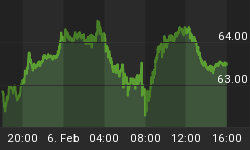After hitting a 5-year high yesterday the Nasdaq is up by 110% since its October 7, 2002 bottom. If this blistering pace keeps up the Nasdaq will be back above 5,000 (only another 113% away!) sometime in 2010. However, what comes first, Nasdaq 5,000 or a very deep sleep, it is difficult to say.
What can be said is that US stocks are in one of the most boring bull markets ever (call it a cyclical bull inside of a secular bear if you want, but the longevity of this rally means it is a bull nonetheless). And while some would argue that boring is good because it means the markets haven't peaked, sometimes boring is just boring.
What Are The Stock Bulls Afraid of?
The easiest way to figure out where a bull is raging is to ask yourself what is in short supply. During the 1990s cutting edge technology products and stock shares were in short supply and, after the 2000 stock market bust, real estate was in short supply. As for what is in short supply today, look to oil, silver, copper, sugar, and railway capacity. On this last item, a few charts will suffice.


The potential problem with commodities and transportation services being in short supply is that they are economic necessities (the same can not be said about tulip bulbs and Intel's MMX technology). If a construction outfit can't afford materials stuff doesn't built, if companies that use commodities or energy today don't raise prices margins get squeezed, and if an electric utility raises rates because the cost of shipping coal has tripled customers either pay up or declare bankruptcy (if they can), Suffice to say, a bull market in economic necessities raises the specter of a slow down in the broader economy. No wonder equity investors are acting a little timid.
Doesn't Feel and Act Like A Bull
On a more anecdotal note, when was the last time the Dow gained a couple of hundred points in a trading session? Not being able to recall I looked it up: it will be a year ago later this month. Memorable bull markets usually arouse excitement, curiosity, and, eventually, investor envy. With volatility dead, program trades taking a larger slice of volume, and the largest gainers in the market found in energy, dividend, 'stuff' stocks, and Google, it is clear that investor excitement has not been widespread, especially in the Dow.
By contrast, remember if you will when the greatest bull market ever (1982-2000) started to buckle: after a sell of in March 2000 the Dow battled back with a 819 point gain in two sessions. Think about this for a second: in less than two sessions in 2000 the Dow was up by 10.7% (intraday), or more than double the measly 4.8% gain the index has logged since February 17, 2004 until today. To reiterate: one of the most boring bull markets ever!
Also consider that the Dow, which is not far from all-time highs, hasn't been making investors a lot of money lately. Rather, by one measure it has been trading sideways to slightly higher for nearly 2-years. Calling this action 'bullish' is an insult to bull markets.

5-Year Highs Do Lie
Beyond Canadians going crazy trying to acquire a piece of Tim Hortons, only a handful of US stocks have exhibited signs of extreme short supply. Moreover, of the stocks and industries that have corralled the most amount of investor excitement, which railroad stocks can be included, many operate within businesses that pose a potential threat rather than benefit to the broader US economy. As a quick example, bubbling precious metal stocks today (which when you combine them all have a smaller market cap than Wal-Mart), suggest either a pick-up in inflationary pressures and/or a crashing US dollar tomorrow. Both of these scenarios are scary as far as the US economy is concerned.
Yes, despite its unexciting demeanor the major US stock indices have managed to present the appearance of being in a bull market. But no, new 5-year highs do not suggest that record highs are around the corner. With equities rising at a painfully slow pace and other non-equity based investment vehicles becoming more attractive with every Fed rate hike, today's US stock bull lacks the ingredients needed to trigger the greater fool phenomenon. In other words, the boring rally in US stocks since February 2004 has simply been boring, and doesn't portend a mad rush into stocks.
As for the 'necessities bull', because it is being driven by foreign demand for commodities, currency issues, geopolitics, and bottlenecks that can not be fixed quickly, it can remain in play even if the major US stock markets crash. In fact, if the necessities bull doesn't derail soon expect just that.















